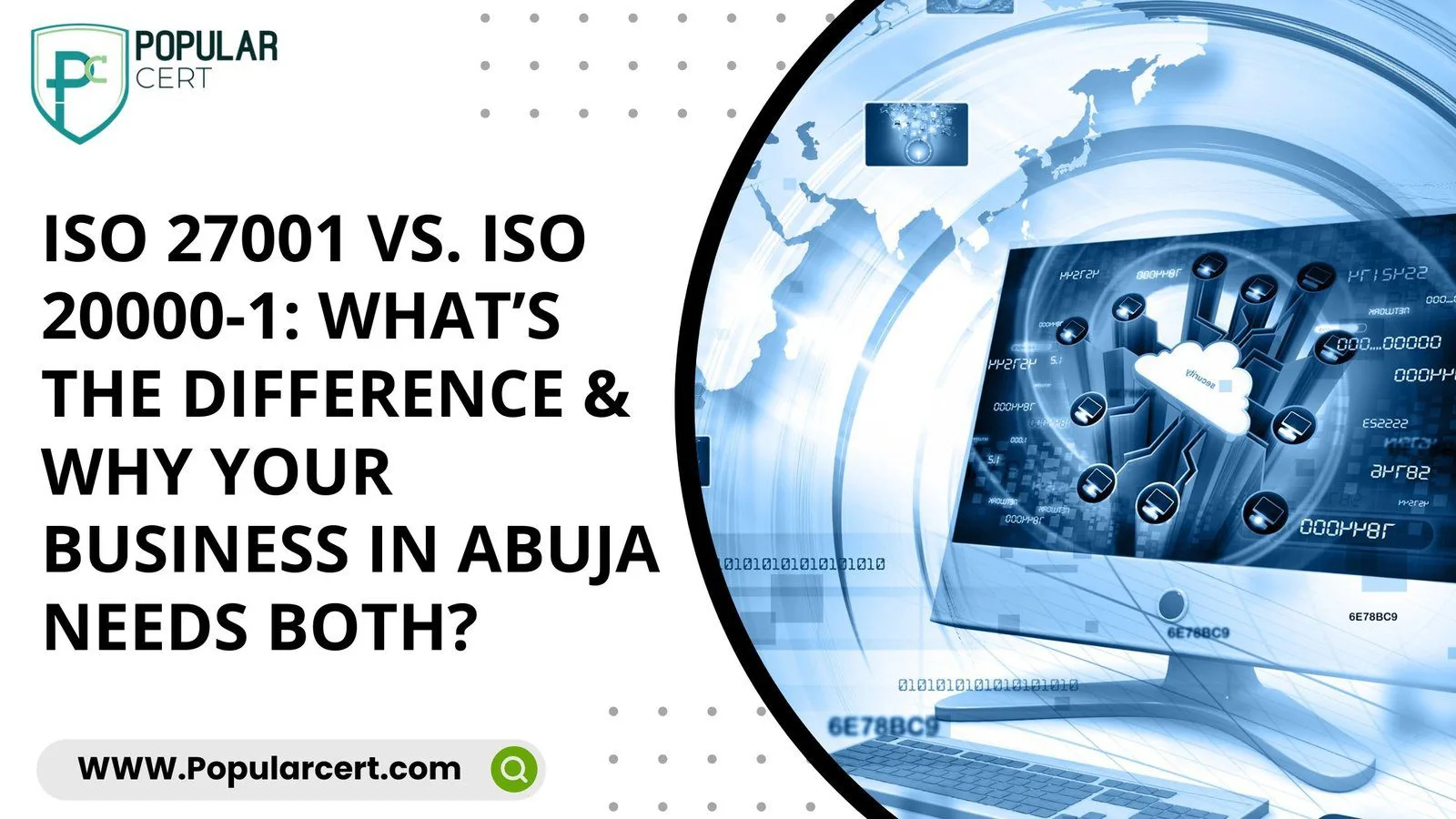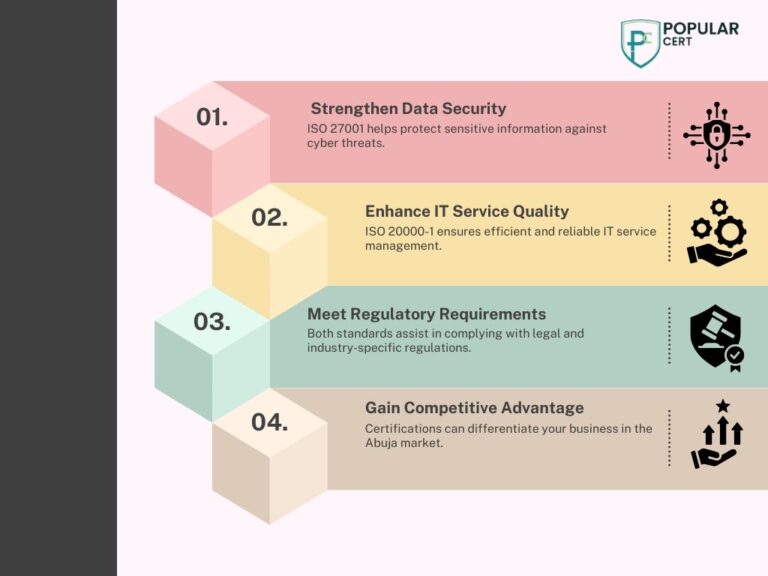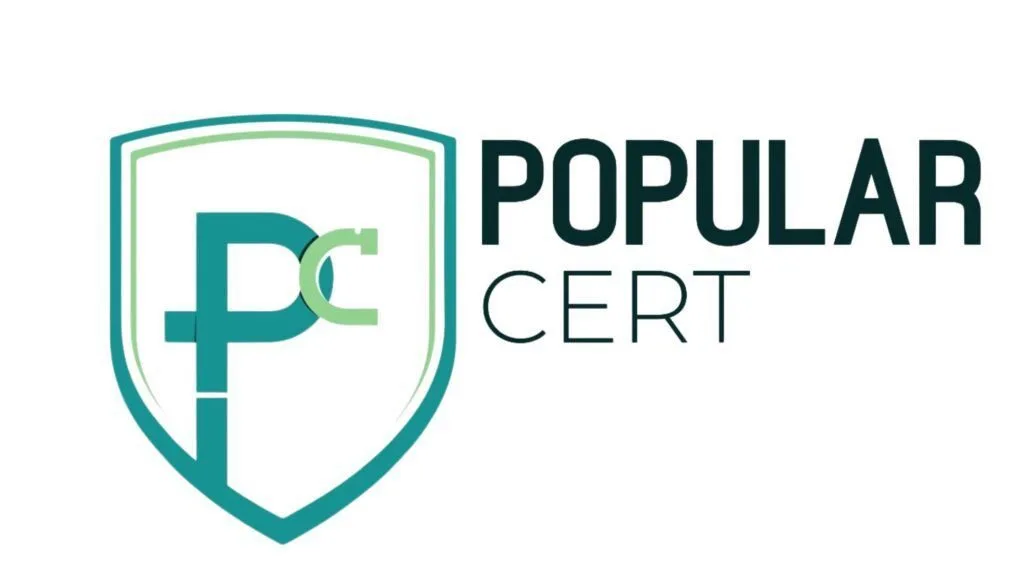ISO 27001 vs. ISO 20000-1: What’s the Difference & Why Your Business in Abuja Needs Both?

Today, no matter the type of business, managing information security and IT service is extremely important. In today’s competitive landscape, the quality of both customer service and IT systems must be managed properly and secured accordingly in order to build trust. This is where ISO 27001 and ISO 20000-1 Certification comes in.
Both serve to improve business processes, but they have different goals. ISO 27001 is designed to safeguard sensitive information from cyber threats while ensuring overall data security. On the other hand, ISO 20000-1 specializes in IT service management that guarantees efficient operations and, thus, total client satisfaction. For the companies based in Abuja, adoption of these standards increases your competitive advantage by improving security measures, lowering operational risks, and enhancing service quality. Whether you’re operating as an IT company, bank, hospital, or a service provider, ISO Certification in Abuja allows you to meet the requirements of international best practice, giving you credibility and enabling higher performance. This blog aims to expound on the differences between ISO 27001 and ISO 20000-1 and the advantages of having both certifications in today’s age.
What is ISO 27001?
ISO 27001, as a standard, defines requirements for establishing an Information Security Management System. It is designed to assist businesses in devising a plan that will mitigate risks against sensitive information due to cyber threats, data leaks, or malicious access.
The Key Focus Areas of ISO 27001:
- Recognizing and addressing security threats
- Taking measures to secure sensitive information
- Meeting legal and other stipulated mandates
- Avoiding cyber threats, impersonation, and information looting
From ISO 27001 certification, companies can build customer confidence, bolster security measures, and safeguard invaluable information resources.
What is ISO 20000-1?
ISO 20000-1 Certification is the international standard for Information Technology Service Management (ITSM). It enables organizations to provide adequate and effective IT services while ensuring their clients are satisfied.
Key Focus Areas of ISO 20000-1:
- Guaranteeing IT services are rendered without interruption
- Managing IT infrastructure in a dependable and economical manner
- Minimizing IT outages and other sorts of technical problems
- Enhancing service delivery response to customers
Having an ISO 20000-1 certification enables organizations to enhance IT services, lower operational expenditures, and improve services efficiency.
ISO 27001 vs. ISO 20000-1: The Key Differences?
Focus Area:
- ISO 27001: Information Security
- ISO 20000-1: IT Service Management
Objective:
- ISO 27001: Safeguard sensitive information against cyber threats
- ISO 20000-1: Enhance efficiency of IT services delivery
Compliance:
- ISO 27001: Protection of sensitive data
- ISO 20000-1: Protection of data is defined in business serviced requirements
Risk Management :
- ISO 27001: Reduces Risk for Cybersecurity Issues
- ISO 20000-1: Improves IT Support Services and Minimizes Downtime
Who Implements It?
- ISO 27001: Banking sector, hospitals, e-commerce systems, IT companies.
- ISO 20000-1: Providers of IT services, companies that provide cloud services, telecom companies.
Although both standards are geared toward information technology and the business industry, they have distinct yet supportive roles. ISO 27001 secures your data and privacy, while ISO 20000-1 focuses on the delivery aspects of information technology services.
Types Of Certification
- ISO Certification
- ISO 9001 Certification
- ISO 14001 Certification
- ISO 45001 Certification
- ISO 22000 Certification
- ISO 27001 Certification
- ISO 17025 Certification
- ISO 13485 Certification
- ISO 20000-1 Certification
- ISO 22301 Certification
- ISO 50001 Certification
- ISO 37001 Certification
- IATF 16949 Certification
- ISO 29001 Certification
- ISO 31000 Certification
- ISO 20121 Certification
- ISO 10002 Certification
- ISO 41001 Certification
Get Free Consultation
Our Clients


















Why Your Business Needs Both Certifications?
Leverage on IT has become a necessity for so many businesses in Abuja, and in Nigeria generally. If your firm manages sensitive data alongside IT service management, utilizing both of these certifications can offer the following advantages:
Improved Protection & IT Service Quality
ISO 27001 certifies that a company holds trust in its users personal information. Under ISO 20000-1, the company promises preservation of their users, I.T. services. The two offer the ideal trust in protection and services.
Compliance with Regulations
Both certifications enable organizations to comply with Nigeria’s and other country’s legal standards without incurring any legal penalties or compliance complexities.
Improved Trust Among Customers Leads to Increased Business Opportunities
Clients want to work with certified companies that offer secure transactions and IT support. These certifications enhance your reputation and increase the likelihood of your earning contracts.
Cost Minimization & Risk Mitigation
While ISO 27001 minimizes the risk of a data breach, ISO 20000-1 minimizes IT outages and delays, which in turn improves the organization’s finances.
Enhanced Market Opportunities
More clients and international businesses will deal with certified organizations because they offer lower prices due to less operational costs.

Implementation Process for ISO 27001 & ISO 20000-1?
If your business in Abuja wants to achieve ISO 27001 and ISO 20000-1 certification, here’s how the process works:
Step 1: Consulting and Gap Analysis
A consultant studies the existing security and IT management systems and identifies gaps in the current situation.
Step 2: Creating Policies and Documents
The company must draft security policies, IT service processes, and compliance documents to satisfy ISO expectations.
Step 3: Training of Employees
Staff members need awareness training related to the security perils and the IT service management procedures.
Step 4: Implementation & Internal Audits
The company will adopt the Internal procedures manual calibrated to frameworks ISO 27001 & ISO 20000-1 and periodically conduct internal audits.
Step 5: Certification Audit & Approval
The certification body assesses the compliance of your entity and if it is adequate, then issues a certificate.
Why Choose Popularcert for ISO 27001 & ISO 20000-1 Certification?
Popularcert is the most reliable name for certification in Abuja. Our services include expert consultations, full documentation, and employee training for your smooth certification. With our pre-audit preparations, we make audits stress-free, while our unique process helps save time and money on certification. Work with Popularcert to easily obtain certifications like ISO 27001 & ISO 20000-1 and enhance your IT security and service management. Get certified today with Popularcert!
GET A FREE CONSULTATION NOW
FAQ
What is the cost of ISO 27001 and ISO 20000-1 certification in Abuja?
The cost varies depending on the business profile and the size of the organization. Popularcert can provide a personalized quote upon request.
Can a small business get ISO 27001 & ISO 20000-1 certified?
Absolutely! Small businesses can certify provided they have the right skilled personnels along with an effective implementation plan.
How long does the certification process take?
That differs from business to business, but on average, companies take about 3-6 months on getting certified with proper guidance.
Is certification mandatory in Nigeria?
No, it is not required by law, but in order to comply with regulations and earn the trust of customers, many corporations utilize ISO 27001 & ISO 20000-1 certificates.
